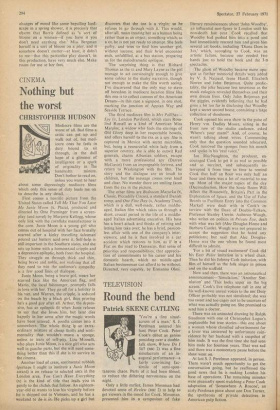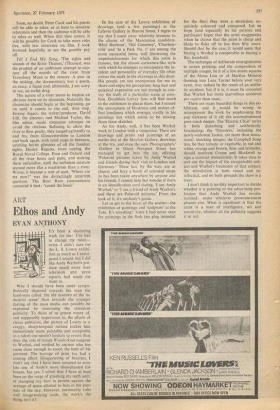TELEVISION
Round the bend
Patrick SKENE CATLING
Only a little earlier, James Mossman had devoted some of Review (snc 2) to help to get viewers in the mood for Cook. Mossman presented him in a symposium of fake literary reminiscences about 'John Woodby', an influential non-figure in London until his non-death last year. Cook recalled that Woodby had pushed him into a pond and had immediately rescued him and given him several art books, including 'Diana Dors in 3-o,' which, accooding to Cook, was an artistic failure, because one needed two hands just to hold the book and the 3-D spectacles.
The ghost of Woodby became more opa- que as further memorial details were added by V. S. Naipaul, Irene Handl, Elizabeth Bowen and John Betjeman. Quite predic- tably, the joke became less unserious as the mock eulogists revealed themselves and their own dream lives. Only John Betjeman got the giggles, evidently believing that he had gone a bit too far in disclosing that Woodby kept a secret second home, containing a large collection of shoehorns.
Cook opened his own show in the guise of Henry viii. Dudley Moore, sitting in the front row of the studio audience, asked 'Where's your mate?' And, of course, he wasn't talking about wives. Commenting only that the question sounded rehearsed, Cook removed the sponges from his mouth and spoke in his 'real voice.'
Ian MacNaughton, the producer, en- couraged Cook to get it as real as possible and as succinct, and subsequently in- terrupted it from time to time to remind Cook that half an hour was only half an hour and there was a lot of material to use up. Most of the major topics of the day (Decimalisation, How the Sonic Boom Will Affect the Housewife, Britain's Part in the Exploration of Space, and the Use of False Beards to Facilitate Entry into the Common Market) were dealt with in Cook's in- terview with the Dean of Double-Talkers, Professor Stanley Unwin. Auberon Waugh, who writes on politics in Private Eye, dealt with what was left (Alec Douglas-Home and Barbara Castle). Waugh was not prepared to accept the suggestion that he hated any politicians; but said that Alec Douglas- Home was the one whom he found most difficult to admire.
'For a bit of visual excitement' Cook did his Easy Rider imitation in -a wheel chair.
Then he did his Johnny Cash imitation, with film of himself as the folk singer in prison and on the scaffold.
Now and then, there was an astronautical announcement—'Simulation,' Another Sim- ulation' and 'This looks super on the big screen.' Cook's live telephone call in one of his well-known unreal voices to the BBC Duty Officer probably was not simulated; she was too sweet and too cagey not to be unaware of what was actually going on. She promised to send him a doctor.
There was an animated drawing by Ralph Steadman with one of Christopher Logue's implausible but true stories—this one about a woman whose classified advertisement for a lover was answered by unfortunate coin- cidence by her husband with a snapshot of him nude. It was the first time she had seen him nude for fourteen years. That was sad and there was a momentary pause before the show went on.
At last S. J. Perelman appeared, in person. There wasn't much opportunity to get the conversation going, but he reaffirmed the good news that he is making London his base of operations. The remaining minutes' were pleasantly spent watching a Peter Cook adaptation of 'Somewhere A Roscoe', an early Perelman piece about one Dan Turner, the apotheosis of private detectives in American pulp fiction. Soon, no doubt, Peter Cook and his guests will be able to relax, or at least to simulate relaxation and then the audience will be able to relax as well. When that time comes, it will be possible for Cook to take more risks live, with less insurance on film. I look forward hopefully to see the gamble pay off.
Till 1 End My Song, 'The sights and sounds of the River Thames,' (Thames), was the product of an ambitious attempt to cap- ture all the moods of the river from Trewsbury Mead to the estuary. A year in the making, the documentary was a poem, an essay, a fugue and, ultimately, I am sorry to say, an awful drag.
The nature of a river seems to impose an obvious form on its chronicle. Naturally the chronicler should begin at the beginning, go on until it comes to the end, then stop. Jeremy Isaacs, the writer/producer, David Gill, the director, and Michael Taylor, the film editor, made strenuous attempts to avoid the obvious. Refusing to allow the river to flow gently, they ranged agitatedly to and fro, from Gloucestershire to London and back again, with brief stops in between, catching hectic glimpses of all the familiar sights, Henley Regatta, swan upping, the Royal Naval College, Eton and Oxford and all the river boats and pubs, and making them unfamiliar, until the turbulent mixture seemed more like a maelstrom than a river. Worse, it became a sort of quiz. 'Where are we now?' was the distractingly recurrent question. The Boat Race commentator answered it best: 'round the bend.'



































 Previous page
Previous page